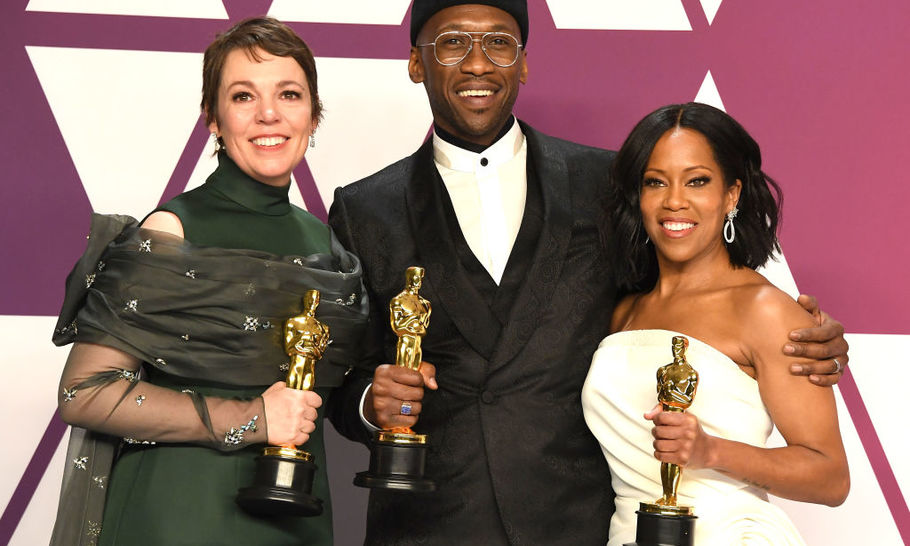What's happening to the Oscars?

Steve Granitz/WireImage
The TV ratings for last year’s Oscars were a disaster. They hit a record low with just over 26 million viewers, 19% below the figures from 2017. According to Variety , “the ratings fell off a cliff.” The Oscars are “facing irrelevance”.
It’s not hard to work out why. There is now a growing gap between the films that get nominated and the films that people actually pay to see. The films nominated for Best Picture last year averaged $63 million at the US box office. Films like The Post, Darkest Hour and Lady Bird all failed to make $50 million at the box office by the time they were nominated. The winner for best picture, The Shape of Water , did even worse. It barely scraped $30 million. You don’t have to be a genius to work out that not many people are going to want to watch an awards ceremony for films they have no desire to watch.
How about this year’s Oscars? The TV audience increased somewhat, back up by just over 3 million viewers . That’s bit of an improvement, but not much. And the reason is the same. Only four films nominated for Best Picture this year ( Black Panther , A Star Is Born and Bohemian Rhapsody, Green Book ) made over $50 million before the announcement. Put another way, these were the only films nominated for Best Picture which made the top 50 domestic grosses in the US. The Favourite is currently 84 th in the US box office charts.
Why the disconnect between the films that get nominated and the films that most Americans actually go to see? The main reason is that for years the people who vote for the Oscars like liberal art-house movies. This year they voted for films with black characters ( Green Book , Black Panther , BlackkKlansman, If Beale Street Could Talk ) and gay characters ( The Favourite ). There was also the added twist of Mexican cleaners ( Roma ). This presumably spoke to rich Californians who mostly employ underpaid Mexicans and hate Trump, not least because of the Wall. Conversely, films about white characters ( Vice, A Star is Born , Bohemian Rhapsody ) didn’t win any big awards, though they did well at the Box Office.
The Oscars have never been so political. Of course, there were no Oscars for that ‘red’ Charlie Chaplin. And think of the 1968 Academy Awards when the main Oscars were split between In the Heat of the Night and Guess Who’s Coming to Dinner? But by and large, the Oscars have always loved middlebrow arthouse movies with liberal politics. Since the 1970s, however, Spielberg and Lucas revolutionised American film with hugely popular commercial hits.
Now, however, the politics of the Oscars are moving dramatically from political liberalism to gender and identity politics. What is striking about the 2019 awards is that there were two outstanding Political films up for consideration – political with a capital P. First, there was Pawel Pawlikowski’s superb black-and-white film, Cold War , about Polish Communism after the war. And then there was Adam McKay’s film, Vice , about Vice-President Dick Cheney and the Bush presidency. Both were serious and thoughtful films about major political stories, brilliantly acted and directed. It didn’t do either any good. Neither won a single major award.
What the Oscars are about now is not Politics but identity politics: blacks, gays, women, all those left out or marginalised in traditional Hollywood films. The Oscars are more politically correct than the Democratic National Convention. And like the DNC lots of ordinary Americans don’t vote for them. They would rather go and see Robert Downey Jr in Avengers: Infinity War, which grossed almost $700 million in the US, Chris Pratt in Jurassic World: Fallen Kingdom which has grossed over $400 million, or Tom Cruise in Mission Impossible – Fallout ($220 million).
It’s not that these gender identity films are not good. Roma is beautifully filmed, if overrated. If Beale Street Could Talk is superbly filmed and brilliantly cast with a great soundtrack too. The Academy Award for Regina King as Best Supporting Actress is well deserved. And, of course, it is important to encourage diversity and minorities. Thanks to directors like Steve McQueen and Barry Jenkins, young Black directors know they can now break into the American film industry. Alfonso Cuarón ’s success will encourage countless young Central and South American filmmakers.
That is not at issue. What we want, though, is for black, Hispanic and women directors to break out of the margins and start directing huge box office hits, for all kinds of actors to play lead roles in big-budget films for mainstream audiences. At the moment Will Smith is the only black star who can be cast as the lead in a film which will gross over $100 million. There is still talk of Idris Elba succeeding Daniel Craig as James Bond, and that would be a huge cultural turning-point.
But there is another issue. We need to do something about the growing divide between films that win Academy Awards and films that tens of millions pay to watch. This divide reflects a larger cultural and political divide in America and that is what is worrying. At the rate things are going the Oscars are going to lose their TV audience completely. They are becoming irrelevant because a whole tradition of filmmaking is becoming completely peripheral for mainstream audiences. It is always a cause for concern when a culture fragments, especially if it starts to break into two different camps.





